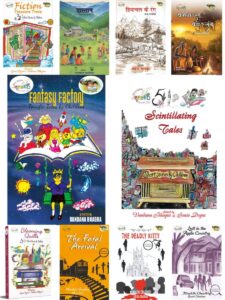Lakshmi Rameshwar Rao, Hyderabad
Gijubhai Badheka (1885 – 1939) was an educator who helped to introduce Montessori education methods to India. In 1920; Badheka founded the “Bal Mandir” pre-primary school. Badheka published a number of works in the field of education including Divaswapna (“Daydreams”) which is an Indian classic on education.
 Bereft of educational jargon, it is an inspiring tale of a school teacher who, despite severe odds, tries to make learning fun. It tells what one teacher was able to do when given a chance and a little help. Even in the 1920’s, Gijubhai was able to sense the futility of a stupid textbook.
Bereft of educational jargon, it is an inspiring tale of a school teacher who, despite severe odds, tries to make learning fun. It tells what one teacher was able to do when given a chance and a little help. Even in the 1920’s, Gijubhai was able to sense the futility of a stupid textbook.
Gijubhai had his own views on the educational system. He believed that it is the absolute duty and responsibility of the teacher to check if children were learning out of zest and desire. Gijubhai believed that children have different levels of learning capacities.
Gijubhai had his own views on the educational system. He believed that it is the absolute duty and responsibility of the teacher to check if children were learning out of zest and desire.
Aims of Education: Gijubhai Badheka
“Games are real education. Great powers are born on the playground. Games mean character-building.” —Gijubhai Badheka.
Gijubhai is a pioneer educationist of India who has written extensively on the matter. His ideas behind how a young child’s mind develops in the pre-school or formative years are of immense relevance.
He has published close to 200 works including storybooks. His focus was on books for children, parents, educators. According to Gijubhai Badheka, education must cultivate rationality, harmony, balanced, natural and useful life.
Education is the process of complete unfolding of a child’s personality. It should also develop sense, training, motor efficiency and self-learning. Gijubhai Badheka believed that the most essential quality that children require to cultivate is the interest in learning.
Gijubhai also realised that children must develop a sense of love for learning and he believed that it should be a natural process of learning capacities. He insisted that self-knowledge is different from academic knowledge. Self: knowledge is concerned with the social problems that disturb us and incoherence that is within individuals.
Oneness with nature
Schooling had little influence on the lives of the educationist s like Rabindranath Tagore. The four fundamental principles in his educational philosophy are naturalism, humanism, internationalism and idealism. The educational institutions he was part of, Shanti Niketan and Visva Bharathi are both based on these very principles. He insisted that education should be imparted in natural surroundings.
Tagore said that the principal aim of education should be the development of moral and spiritual aspects of the child’s personality. For this, he emphasized upon inner development, attainment of inner freedom, inner power and enlightenment.
Tagore believed that, one of the main aims of education is to prepare the individual for the service of the nation and education stands for human regeneration, cultural representation, harmony and intellectualism. Educational institutions should build on the power of thinking and imagination in an individual and help turn her/him into a self-sustained building block of human society and a creative canvas of nation on the whole.
Very few have foreseen the emergence of a global community and the need to educate students in a manner where they not only learned to appreciate their own culture, but they would also be able to identify with people who were culturally different. Tagore argued for education that would help develop sensitivity in a student by directly experiencing nature.
By fostering a close affinity with nature, students would be able to realize that there is no barrier between their lives and the life of nature. This feeling of oneness with nature would eventually help in developing sympathy and the ability to connect with the outside world.
Basic Education
He believed that education should aim to inculcate the spirit of sympathy, service and self-sacrifice in the individual so that she could extend her/his “love far and wide across all barriers of caste and colour” and embrace the world and humanity in a spirit of oneness or Advitam, rising above egocentrism and ethnocentrism to a state of global consciousness.
In a lecture entitled, “To Teachers,” delivered in China in 1924, Tagore explained: “Education must enable every child to understand and fulfill this purpose of the age, not defeat it by acquiring the habit of creating divisions and cherishing national prejudices.
In a letter to Mahatma Gandhi, Rabindernath Tagore likened his educational experiment at Santiniketan to a vessel carrying the cargo of his “life’s best treasure.” He spent forty years of his life establishing Visva-Bharati, which had wide influence in Europe, Japan and the United States. It was a unique educational institution, which emphasized the education of the whole person.
The education system proposed by Mahatma Gandhi is “Basic Education”. He aims at the education in mother tongue and asked for activity centered education to make the children skilled and independent. Gandhi wanted to construct small, self-reliant communities with its ideal citizens being all industrious, self-respecting and generous individuals living in a small co-operative and community.
He wished that some local craft should be made as medium of education for children so that they develop their mind, body and soul in a harmonious way and also meet the needs of their future life. Gandhi an Educational thought are relevant for development and providing solutions of the current problems like unemployment, poverty, corruption and many others.
Gandhi wished that some local craft should be made as medium of education for children so that they develop their mind, body and soul in a harmonious way and also meet the needs of their future life. Such Gandhi Educational thoughts are relevant for development and providing solutions of the current problems like unemployment, poverty, corruption and many others.
‘Basic Education’ was job centered, value based and mass oriented. Here it is important to note that these are still the important requirements of education in our country. In his scheme of education, knowledge must be related to activity and practical experiences. Therefore curriculum is activity centered. Its aim is to prepare the child for practical work, conduct experiments and do research so that he is able to develop himself physically, mentally and spiritually and become a useful member of society.
In this activity-centered curriculum, Gandhi included Mother-tongue, Basic Craft, and Arithmetic, Sociology, General Science, Art, Music and other like subjects. He further advocated that curriculum for boys and girls from classes 1 to 5 should be the same. After that boys should be taught some Craft and girls should study Home-Science.
His philosophy of education is a harmonious blending of Idealism, Naturalism and Pragmatism. Idealism is the base of Gandhi’s philosophy whereas Naturalism and Pragmatism are the helpers in translating that philosophy into practice. Education, like family, marriage, religion, law and politics is one of the important institutions of society which play pivotal role in maintaining and developing social system.
Gandhiji’s contribution to education is unique in this sense that he made the first attempt to develop an indigenous scheme of education in British India. With the advent of British colonial rule in India, an alien system of imperial education was introduced which was in contradiction with the age-old, unique and all-inclusive holistic educational system of India. It has not only caused irreparable damage to Indian education system in the long run, but also created numbers of all kinds of differences, class-consciousness, ever increasing crave for western materialistic life style.
Mahatma Gandhi is a spirit of profound wisdom and captivating humility, armed with only an iron will and inflexible resolve and a frail man who confronted the brutality of military strength with the dignity of a simple human being. He believed in God implicitly. According to him, though individuals have different bodies, yet the same soul pervades in all of us. In short, Gandhi experienced and realized Unity in Diversity. His philosophy of life has four elements namely – (1) Truth, (2) Non-Violence (3) Fearlessness and (4) Satyagraha Gandhiji’s philosophy to life is based upon the philosophy of Idealism. He advocated the ideals of truth, non-violence and moral values to achieve the ultimate truth of self-realization.
Thus, in Gandhiji’s educational thoughts the development of the personality of child is more important than mere literacy or knowledge of different subjects. In other words he believed in life-centered as well as child-centered education. Besides learning of three R’s Reading, Writing and Arithmetic in school, he insisted on development of these H’s Hand, Heart and Head. Thus, the aim of Education should be of developing the integrated personality of the child.
Gandhiji’s philosophy of non-violence has great relevance in current scenario. According to him non-violence does not mean meek submission to the will of the evil doer. It is the soul force or truth force. The purpose of his Satyagrah is to fight against injustice. Satyagrah should have the moral face to achieve change of heart by self-suffering of the adherence of truth and non-violence. Such philosophy of life helped him in developing his philosophy of Education which can be the true source of inspiration for the present system of education.
(The writer has a Masters degree in Adult Education from Jamia Milia Islamia, many years teaching experience at the school level and ten years of experience in book publishing and some published writing in newspapers and more students’ books. Lakshmi has retired and lives in Hyderabad.)



